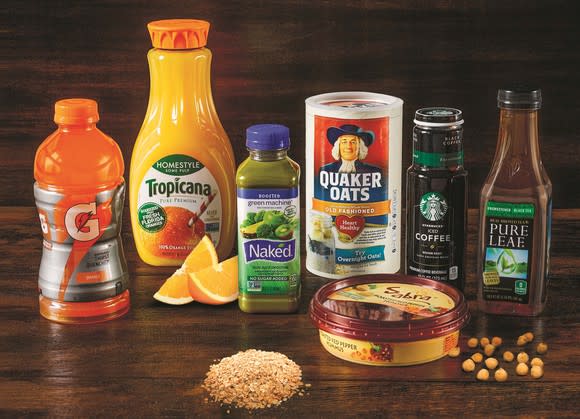Better Buy: Coca-Cola vs. PepsiCo
Cola enthusiasts have long fought about the relative virtues of Coca-Cola (NYSE: KO) and PepsiCo (NYSE: PEP). Although there might never be a final answer to the question of which namesake cola is the better product, both of these companies have a key challenge in common: keeping up with changing tastes among consumers while avoiding potential regulatory hurdles. One key difference between the two stocks is that PepsiCo incorporates not only Pepsi beverages but also Frito-Lay snacks, and greater diversification offers PepsiCo shareholders a different set of risks and rewards from Coca-Cola's purer play on liquids.
Let's see how Coca-Cola and PepsiCo compare to determine which is the better buy right now.
Valuation and stock performance
Coca-Cola and PepsiCo have had solid performances over the past year. Coca-Cola stock has done better than PepsiCo, with a 12% return compared to the 6% the Pepsi maker has produced.
Lagging performance sometimes creates value opportunities, and that's been the case, to some extent, with PepsiCo. When you look at simple earnings-based valuation metrics, PepsiCo looks a lot cheaper on a trailing basis, with its shares fetching 24 times trailing earnings compared to a price-to-earnings ratio of nearly 50 for Coca-Cola. Yet much of that disparity is due to corporate shifts within the business at Coca-Cola. The gap narrows when you incorporate forward-looking estimates into the mix, but even then, PepsiCo is a bit cheaper, with its forward multiple of 20 compared to the nearly 24 times forward earnings at which Coca-Cola stock trades. Based on these numbers, PepsiCo has an advantage over Coca-Cola.

Dividends
Both Coca-Cola and PepsiCo have been good to dividend investors over time. Coca-Cola's current yield is slightly higher, at 3.2%, but the 2.9% yield PepsiCo pays isn't far behind. From a sustainability standpoint, the one-time charges Coca-Cola has taken have sent its payout ratio upward to unattractive levels above 150%, but most investors expect that figure to fall back to a healthier range in the near future. PepsiCo has sustained its payout ratio at about 65%, and that arguably gives it more flexibility in planning capital allocation moves going forward.
Both companies have also put together track records of dividend growth. For 55 straight years, Coca-Cola has given shareholders plenty of annual dividend increases, most recently with a 6% boost in March. PepsiCo's streak weighs in at 45 years, with a 7% rise in May that helped it keep up the pace.
With similar histories, it's hard to pick a winner from these stocks from a dividend perspective. The safety of PepsiCo's payout offsets the higher yield and longer streak of dividend growth from Coca-Cola.
Growth prospects and risks
It has been interesting to watch the ways in which these two companies have responded to the challenge of shifting consumer preferences. Coca-Cola has focused on longer-term restructuring efforts that have included the sale of nearly all of its bottling operations to outside companies. By doing so, the company has increased its operating margin, reducing the amount of capital it has to expend on maintaining and updating equipment and other physical assets. By doing so, CEO James Quincey hopes to have more latitude with which to experiment with new flavors and beverage lines. Efforts to incorporate healthier options into its beverage line are showing some early signs of progress, but it's too early to tell whether the beverage giant is truly on the right track.
By contrast, PepsiCo has already adapted to the changing situation in the industry. Its beverage line has seen some of the same headwinds that Coca-Cola has suffered, but its snack unit has performed much better. In its most recent quarterly results, PepsiCo said that even though the North American bottling segment saw a 5% drop in organic growth on a 6% decline in volume, Frito-Lay continued to prosper and represents an increasingly important part of the overall business. Soft drinks have been particularly weak, but PepsiCo is working hard on products like Gatorade, Tropicana, and LIFEWTR in order to pick up the slack. With CEO Indra Nooyi remaining in tune with changing consumer trends, PepsiCo is in a much better position to keep up and maintain a positive reputation.
Picking Pepsi
PepsiCo is the better buy between these two stocks, largely because its business gives it more opportunities for growth. For Coca-Cola, the main obstacle lies in figuring out a way to go beyond its namesake sugary carbonated beverages to take full advantage of changing customer preferences. If it can't do so, then it could be tough for Coca-Cola to keep up with PepsiCo over the long run.
More From The Motley Fool
Why You're Smart to Buy Shopify Inc. (US) -- Despite Citron's Report
6 Years Later, 6 Charts That Show How Far Apple, Inc. Has Come Since Steve Jobs' Passing
NVIDIA Scores 2 Drone Wins -- Including the AI for an E-Commerce Giant's Delivery Drones
Dan Caplinger has no position in any of the stocks mentioned. The Motley Fool recommends PepsiCo. The Motley Fool has a disclosure policy.

 Yahoo Finance
Yahoo Finance 